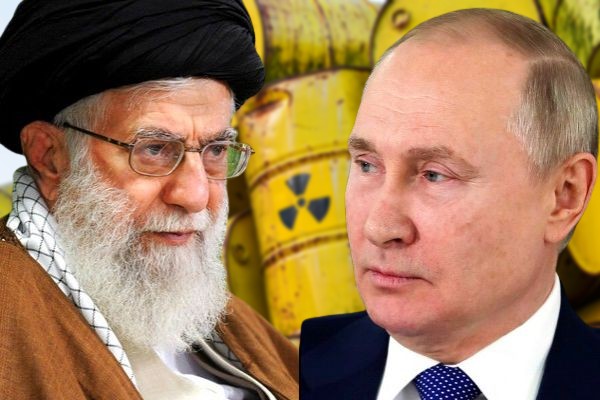“We, of course, would not sanction Russian participation in nuclear projects that are part of resuming full implementation of the JCPOA,” says State Dept. spokesman.
By Adam Kredo, Washington Free Beacon
Russia’s top state-controlled energy company is set to cash in on a $10 billion contract to build out one of Iran’s most contested nuclear sites as part of concessions granted in the soon-to-be-announced nuclear agreement that will guarantee sanctions on both countries are lifted.
Russian and Iranian documents translated for the Washington Free Beacon show that Rosatom, Russia’s leading energy company, has a $10 billion contract with Iran’s atomic energy organization to expand Tehran’s Bushehr nuclear plant. Russia and the Biden administration confirmed on Tuesday that the new nuclear agreement includes carveouts that will waive sanctions on both countries so that Russia can make good on this contract.
“We, of course, would not sanction Russian participation in nuclear projects that are part of resuming full implementation of the JCPOA,” State Department spokesman Ned Price confirmed on Tuesday, referring to the original 2015 nuclear accord.
Russia’s foreign ministry made a similar statement on Tuesday, saying that “additions were made to the text of the future agreement on JCPOA restoration to ensure that all the JCPOA-related projects, [especially] with Russian participation, as well as Bushehr [nuclear power plant], are protected from negative impact of anti-Russian restrictions” by the United States and European Union.
The removal of these sanctions will provide Moscow’s Rosatom company with a critical source of revenue as American and European sanctions crush Russia’s economy in response to its unprovoked invasion of Ukraine.
The concessions to Moscow have generated frustration on Capitol Hill, with top Republican leaders accusing the Biden administration of weakening penalties on Russia to secure an agreement with Iran. Moscow has served as the United States’ top interlocutor in talks, even as the country’s war machine rolls across Ukraine. The Free Beacon first reported on Tuesday that a policy document circulating among lawmakers exposes how the new nuclear agreement will create a “sanctions evasion hub” for Russian president Vladimir Putin.
A State Department spokesman, speaking on background, told the Free Beacon the administration continues “to engage with Russia on a return to full implementation of the JCPOA. As Secretary Blinken said last week, ‘Russia continues to be engaged in those efforts, and it has its own interests in ensuring that Iran is not able to acquire a nuclear weapon.'”
The official further confirmed that the United States will “not sanction Russian participation in nuclear projects that are part of resuming full implementation of the JCPOA,” such as work on Iran’s civilian nuclear program. “The United States will take actions as necessary to ensure that U.S. sanctions do not apply to the implementation of JCPOA nuclear-related projects and activities by non-U.S. individuals and entities,” the official said.
“Perhaps,” the spokesman added, “it is now clear to Moscow that, as we have said publicly, the new Russia-related sanctions are unrelated to the JCPOA and should not have any impact on its implementation.”
Gabriel Noronha, a former State Department special adviser for Iran under Secretary of State Mike Pompeo, told the Free Beacon that Russia is being awarded a financial lifeline via the nuclear agreement, undermining international efforts to isolate Moscow.
“Rosatom’s projects in Iran are crucial to the company’s future financial viability—that’s exactly why we should shut them down by disrupting their foreign contracts—especially those with a regime like Iran,” Noronha said. “We’re doing the opposite. The United States should sanction Rosatom for its involvement in Russia’s war on Ukraine, but in classic fashion, we’re giving them full sanctions immunity that will stabilize Rosatom’s finances.”
Rosatom’s contract with Iran has Moscow constructing two blocks of the Bushehr nuclear plant, which are set to go online in 2024 and 2026.
As of last year, Iran owed Russia $500 million for past work on the country’s nuclear program. Russia could not access this money due to Trump administration sanctions that blocked Tehran from accessing funds held in Japanese and South Korean banks. These sanctions are set to be lifted as part of the upcoming nuclear deal.
The Biden administration took preemptive steps in February to unwind nuclear sanctions impacting Iran, Russia, and China. Sanctions waivers issued by the administration at that time were viewed as an upfront concession to Iran and allowed Russia to restart its nuclear projects in Iran.
The concessions being made in negotiations over the nuclear accord were recently touted by Russia’s top negotiator, Mikhail Ulyanov. He said last week that Iran, Russia, and China partnered in talks to ensure the United States grants a bouquet of perks benefiting each of those countries.
“I am absolutely sincere in this regard. Iran got much more than it could expect,” Ulyanov said. “Much more. … Realistically speaking, Iran got more than frankly I expected, others expected. This is a matter of fact.”
Noronha warned that the final agreement will help legitimize Moscow at a time when it should be isolated.
“Providing Rosatom a guaranteed $10 billion lifeline right now is just another example of how this administration is undermining all its anti-Russia rhetoric with hidden technical concessions that keep Putin and his cronies’ companies afloat,” Noronha said. “It’s got to stop.”
